Schawuot / 23.05.2015 / 5.Sivan 5775
For the Shavuot celebration 5575 and thus for the learning night, "tikkun olam", a minyan from our community meets in the depot in Gatow. Rita even heats the big oven for us, because it is fresh in here. Our cantor, Jalda, starts singing and we get warm immediately. We then all sing Psalm 122 together to a melody by Shlomo Carlebach.
Jalda reads the first two verses of the psalm and we discuss what they tell us. It says: It is to be hoped that people will meet each other in peace and good. This is followed by the wish that they may sanctify their reality and build a house of the One. Jalda speaks of the legislation at Sinai and quotes from the Torah. The Israelites were taught to do and to hear. To do before they heard? They swear to obey the Mitzvot even before they heard them the first time. They were always there and were given forever.
What could this order of doing first, then hearing mean? Does it mean that the Torah was given and then everyone can know what to do? Only in good actions do they obey the words. We talk about the fact that there is no peace in the world to this day. Just like with the first brothers Cain and Abel, competition and envy still lead to fratricide.
After the Torah was given to us at Sinai, from then on plant and animal sacrifices are offered together. With the Torah, there is no more reason for greed and violence. We are after the escape from the narrowness "Mi zar, and in the plural "From the Narrows", "Mizarim", that is Egypt together on Mount Sinai. Each one for himself and all together receive the Torah. In freedom we receive the Torah.
At this point we take our first break from learning. We go outside, breathe the fresh evening air, see the crescent moon and the planet Venus, in the apparent tete a tete shimmering in the dark firmament, and walk a peaceful round through the small garden of the world religions, through Ritas Botanicum. Some prefer to stay in the carriage house and have kindly set the table for everyone in the meantime. Each one had contributed something milky for the common meal. But after the Kiddush, everyone first takes some of the barley barley soup donated by Etha and prepared for us by Rita. This delicacy, mmhh tasty, must have been made, I am sure, according to the ancient secret "Schit method", which went like this: "We schit in a pot a bissl this and mer schit a bissl that and then mer schit ...! 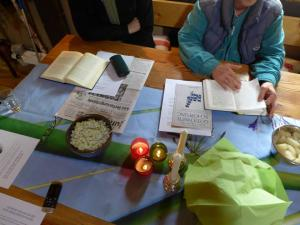
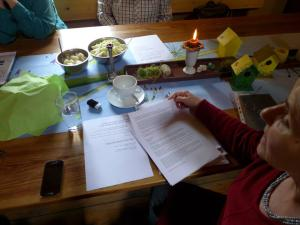
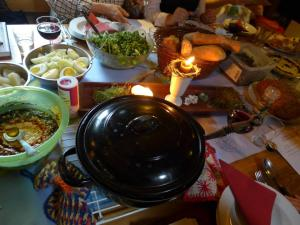 After Pessach, Shavuot is the second harvest festival in the course of the vegetation. There is a lot to do at Shavuot in the fields and with the cattle that have thrown their young during this time. Then there is so much milk that is enough to feed the people so that young animals do not have to be slaughtered and can be raised. This time there is no time to celebrate for another eight days. With Shavuot the omer counting ends. It began at Passover and ends after 49 days, with the legislation of the Sinai on the fiftieth day. The words of the law tell us how we can now live together in freedom and peace.
After Pessach, Shavuot is the second harvest festival in the course of the vegetation. There is a lot to do at Shavuot in the fields and with the cattle that have thrown their young during this time. Then there is so much milk that is enough to feed the people so that young animals do not have to be slaughtered and can be raised. This time there is no time to celebrate for another eight days. With Shavuot the omer counting ends. It began at Passover and ends after 49 days, with the legislation of the Sinai on the fiftieth day. The words of the law tell us how we can now live together in freedom and peace.
Jalda reads on: "The Israelites saw the thunder from the mountain... This is what the Torah says. It does not say: They heard the thunder? We discuss this verse and agree in our understanding that it could be called The Israelites saw, i.e. they had an understanding, an insight, into the message that came to them from the mountain. This insight into the essence of the message goes without th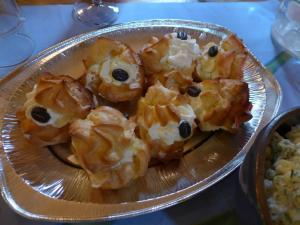 e acoustic perception. It is an inner hearing. They (listen). Insightful people understand this "language". Shma Israel!
e acoustic perception. It is an inner hearing. They (listen). Insightful people understand this "language". Shma Israel!
We hear from the book of Ruth, from her gleaning of the harvested field for a meal. We discuss what made the way of Ruth. She trusts in the One and acts accordingly. She leaves behind everything she knew. Trusting and loyal to her closest person, Naomi, she leaves everything old and is ready to face the new.
We know that milky food is part of the Shavuot tradition and can no longer resist the temptations, in the form of cream puffs and cheesecake, that Gabi and Rita have now prepared.
Dr. Ulrike Offenberg, a rabbinate student, who is about to graduate, came to us tonight as a g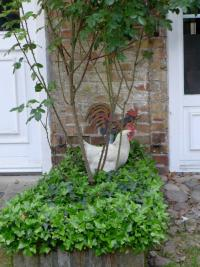 uest of the congregation. She has prepared a skiur. It deals with what can happen in conflict situations. She introduces us to the topic using the example of the two houses of teaching, Schmaii and Hillel, which differ in their opinions and which existed about one generation before the destruction of the 2nd temple. Using various text examples from the Talmudim, from Tosefta and Mishna and others, we can follow what happens when several opinions prevail and discord develops. Who is right now? Both? Or just one? The school of Hillels? Why them? Because she was kinder and gentler in her judgment? Or because editors deliberately favored her? If agreements can seemingly be reached by anyone, is this an idealized representation? In fact, did he only want to enforce his will? Even if this could result in a military conflict?
uest of the congregation. She has prepared a skiur. It deals with what can happen in conflict situations. She introduces us to the topic using the example of the two houses of teaching, Schmaii and Hillel, which differ in their opinions and which existed about one generation before the destruction of the 2nd temple. Using various text examples from the Talmudim, from Tosefta and Mishna and others, we can follow what happens when several opinions prevail and discord develops. Who is right now? Both? Or just one? The school of Hillels? Why them? Because she was kinder and gentler in her judgment? Or because editors deliberately favored her? If agreements can seemingly be reached by anyone, is this an idealized representation? In fact, did he only want to enforce his will? Even if this could result in a military conflict?
We, on this evening, have the hope that everything will turn out well in case of conflict. Both opinions of the teaching houses and other opinions were handed dow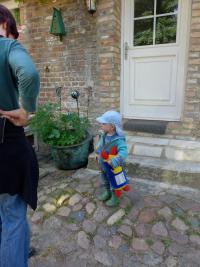 n to us. There is not only one true opinion. This closes the circle of thoughts up to the psalm verses at the beginning of the evening. The people themselves are now responsible for peace, because at Sinai we were given the commandments to act in good. They are no longer in heaven, as the Midrash, which Ulrike tells us at the end, illustrates. We then sing Psalm 122 again together at the end of the learning night and walk towards sunrise and the service, tired but nourished in body and soul.
n to us. There is not only one true opinion. This closes the circle of thoughts up to the psalm verses at the beginning of the evening. The people themselves are now responsible for peace, because at Sinai we were given the commandments to act in good. They are no longer in heaven, as the Midrash, which Ulrike tells us at the end, illustrates. We then sing Psalm 122 again together at the end of the learning night and walk towards sunrise and the service, tired but nourished in body and soul.
Text: Deborah Williger Fotos: Anna Adam
PFLANTING DAY 5775 / 10.5.2015 / 21. Iyar 5775
There was a chill breeze blowing through the fields of Gutshof Gatow on the Sunday afternoon when the Ohelistas gathered for their annual planting day. Toddlers, teenagers, and adults braved the winds to put seeds and starter plants in the ground and in the raised beds that the congregation built last year. With a little help from some sunshine and rain, we will soon have onions, beets, pumpkins, lettuce, zucchini, carrots, and other vegetables, as well as various herbs and flowers to enjoy.
The many helping hands made the planting and watering go quickly so that after only two hours we could all go inside and warm up with some hot soup and other treats. Just as we had finished our refreshments and were ready to head home, the clouds burned off and the sun shone bright and strong. It was a good omen for the new growing season. 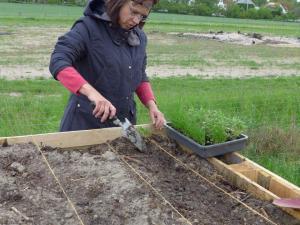
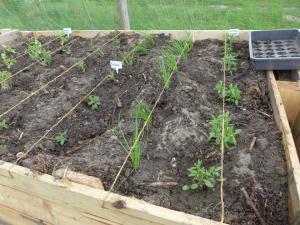
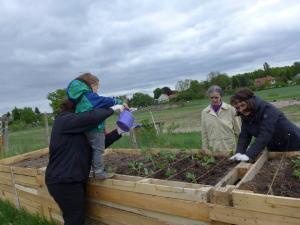
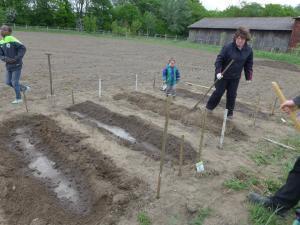
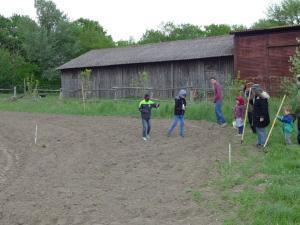
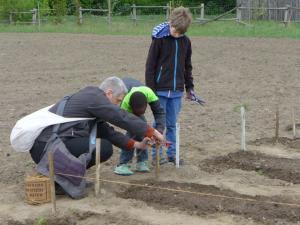
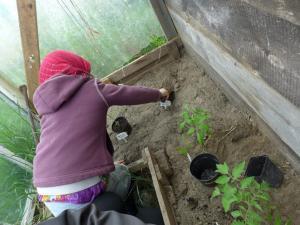
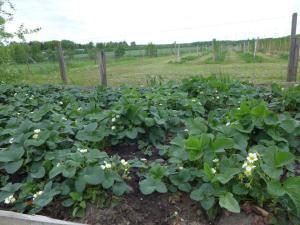
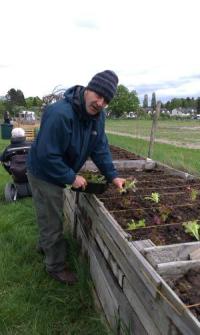
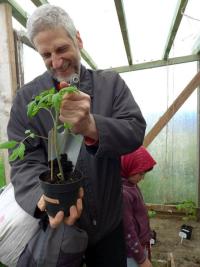
Text: Donna Swarthout Photos: Anna Adam and Donna Swarthout
Seder 5775 / 4.4.2015 / 15. Nissan 5775
Passover is the festival of liberation from Mitzrayim, from the confines of the slavery and from personal narrowness.
But Passover is also the Jewish family celebration par excellence. Most adults get bright eyes when they talk about the Passover celebrations of their childhood.
At our Sedertable sat 40 people, including ten children and many guests who also came the years before. Immediately after entering the room, some of the children asked for our "game blanket" and enjoyed the familiar and new toys.
As last year, we used the beautifully illustrated Haggadah by Michael Shire et al. with transliteration. The illustrations are facsimile reproductions of medieval manuscripts of Ashkenazi and Sephardic origin from the collection of the British Library in London.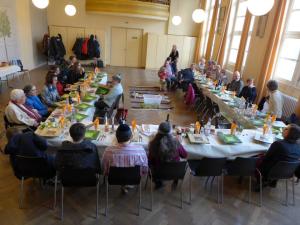
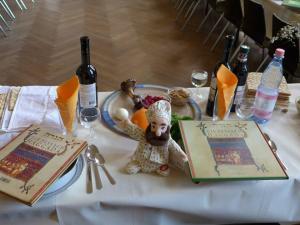
As usual, Cantor Jalda led the reading of the Haggadah with heart and commitment. Almost everybody participated actively in the readings and was moved by the ritual which in its oldest parts is more than two thousand years old.
During the readings some of the children were crawling around under the long tables. Some of us who still knew Lilith z"ll, looked at each other. And at once we shared the same memory: how happy Lilith was, when she told us of the Seders in her Viennese childhood ,when she crawled around under the table with her numerous cousins. This memory of another era has survived many decades.
Anna and her cooking team gave their best. And their best really is the best there is: everything organic, everything homemade. And Anna is not only an artist when dealing with paints, paper and wood, but also in the kitchen. Especially in the use of exotic spices she is an expert. 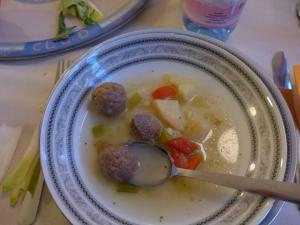
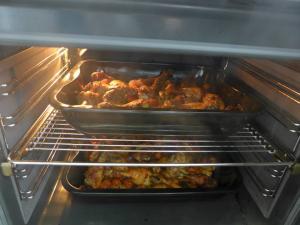
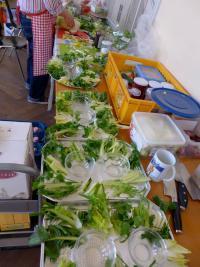
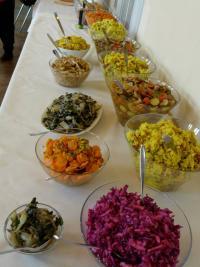
The afikoman was hidden cleverly. Only after a long search Jacob found it, and we were able to close this festive evening with traditional songs. Naturally Jacob was very proud of his success and he, as well as all other children, got his gift. Somewhat overexcited and exhausted, but very happy, they went home. 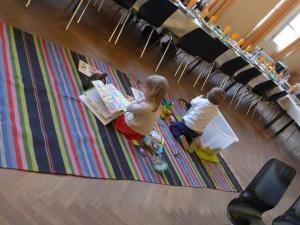
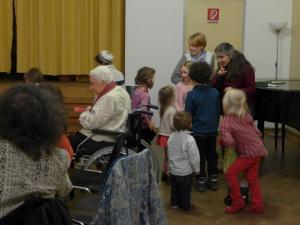
We owe a really special end to our Seder festivity to Helen. She drove well after midnight with the leftover food to the Stadtmission at Bahnhof Zoo and told the homeless gathered there in a few words the meaning of Passover: a festival which represents freedom. Then they all ate together. Helens guests were naturally thrilled by Annas cookery. But in addition they were impressed by Helen´s personal gesture to celebrate with them.
This is part of the spirit of Passover, because it says at the beginning of the Passover Haggadah:
"All who suffer shortage, come and celebrate with us ....."
So we had the opportunity to conclude our Seder with Chesed and a contribution to Tikkun Olam.
A big thank-you to all who have helped us in the preparation and implementation of this festive evening.
Text: Etha Jimenez Photos: Anna Adam Translation: Etha Jimenez and Joseph Rebling
Purim 5775 / 4.3.2015 / 13. Adar 5775
Members of Ohel Hachidusch gathered to celebrate Purim with loads of sweet and savory hamentaschen, freshly baked by our little and grown-up experts, happy and rowdy children dressed as pirates and fairies, and Jona Kirchner´s science fiction spin on the Megillah. Cantor Jalda led us in song, the kids enthusiastically shook their noisemakers, and even the adults got into the action. We ended the celebration in traditional Ohel style with a hearty and healthy vegetarian potluck, which we enjoyed with good conversation and lots of laughter around our community table. 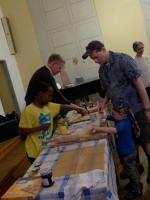
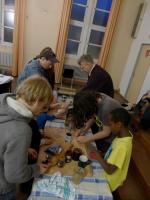
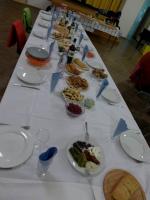
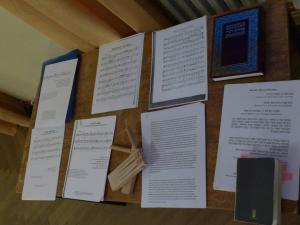
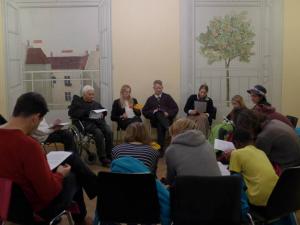
Text: Donna Swarthout Photos: Anna Adam
BatMizwa / 24.01.2015 / 4.Schewat 5775
On 4th of Shevat 5775 , Shabbat Bo, Noa was called to read the Torah for the first time and hereby was accepted into the circle of adults . She read on this Shabbat Mincha the Parasha Beshallach, because Mincha Shabbat we already read the Parasha of the new week.
It was an impressive celebration. Again, as at Mathilda´s Bat Mitzvah, there were three generations standing together on the bimah. Sawta Gaby, ima Mira and Bat Mitzvah Noa read together from the Torah . It was a very touching moment when l´dor va dor - from generation to generation - the Torah was passed on. For the first time, Noa was wearing the tallit which her mother had sewn by hand for her. Before the beginning of Shabbat, Cantor Jalda and Anna, the chairwoman of Ohel Hachidusch, jointly tied the Tziziot with Mira and included many good wishes for the future of Noah therein.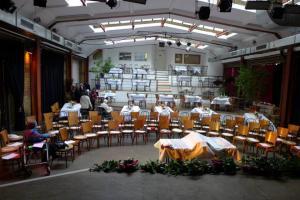
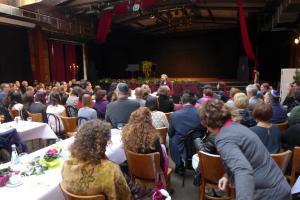
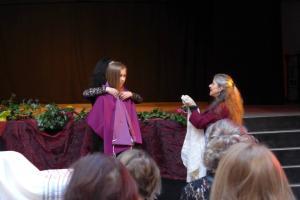
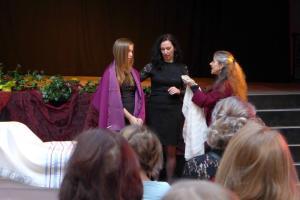
As always, Cantor Jalda led us skilfully and empathically through the ceremony and Anja read the millennia-old Shirat Hajam so touchingly that we all stood at the Red Sea.
As Cantor Jalda gave Noa her blessing, you could have heard a pin drop. Even the numerous children realized that this was a very special moment and sat quiet as a mouse. And then there were big cheers all around. Noa has become Bat Mitzvah and was celebrated tumultuously with a rain of sweets.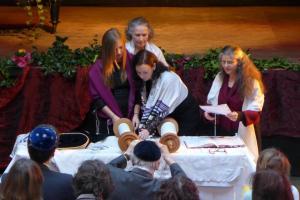
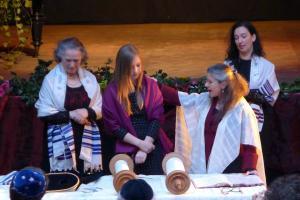
The subsequent Havdalah was marked by our feeling of togetherness. We all stood in a circle, and in a moving ceremony Cantor Jalda took us back into everyday life. Shawuah tov!
And in no time at all our room in the restaurant La Luz was transformed: - all were sitting now at nicely decorated tables, the big stage was free -. Noa´s justly proud father gave a speech in honor of his daughter, a screen was curled up on the big stage, and many snapshots of Noa's life were shown. An Israeli DJ took over the stage; first with songs that Noa's grandmother Gaby had wanted and many sang along. And then it was getting rockier and more colorful. Many danced merrily, - including the children and the elderly. For the Hora hardly anyone stayed sitting on the chairs. Even a few months old baby (on the arm of the mummy) and the nearly 90-year-old Gerhard joined in. Here danced Am Israel, which had crossed the Red Sea and began a life of freedom. -The atmosphere and Noa´s parasha matched perfectly.
Even desert children are hungry. -Our manna was provided by Noa´s sawta Gaby. Meanwhile, coffee and delicious cakes had already been brought to the tables, of course, all baked by Gaby herself. Soon they were followed by a sumptuous hot and cold buffet, everything cooked by Gaby. The Jewish Berlin has known and appreciated Gaby's cooking for years, but here she has exceeded herself. How she managed to take care of so many guests as relaxed and competent as she was, remains a mystery. But it has definitely something to do with her love for Noa. For Noa she once again has outgrown herself. It was a masterpiece and her way of showing her affection.
Dear Gaby and dear Mira, thank you for this unforgettable festival and you, dear Noa, mazel tov for your future. You are a great mischpacha.
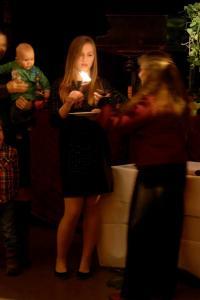
Text: Etha Jimenez Photos: Anna Adam
Translation: Etha Jimenez and Joseph Rebling
Mitzwah Day / 16.11.2014 / 23. cheswan 5775
For Mitzvah Day Ohel Hachidusch hosted a workshop in Gutshof Gatow on a not too well known ecolological problem: contaminated birdfood. Parents and children of the neighborhood were invited to join us.
We prepared birdfood for the feathered and singing creatures who in our latitudes have many problems to find sufficient nourishment in frosty winters. But this was not the only reason for our engagement: while studying the topic more intensively, we had noticed that in some commercial birdfoods, industrial mineral oils and industrial wastes are utilized. Likewise, with the seeds in this inferior birdfood new plant species - i.e. Ambrosia - reach Germany which may do great damage to domestic plants, animals and also humans. No sooner said than done: in the warm carriage house of Gutshof Gatow we heated palm oil in a small pan and added ecologically valuable seeds and grains. We let the mixture cool down and stuffed it in opened pine cones .
The Mitzvah Day ended with warm faces and hearts and around 50 ecologically valuable stuffed pine cones. To the delight of the children, we hung some of the cones on trees and balconies. The birds love them. And pretty soon we will have to prepare a fresh supply. Some families already asked for the recipe and made their own birdfood. Mission accomplished!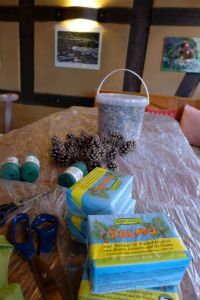
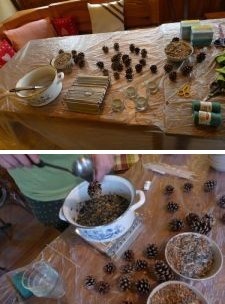
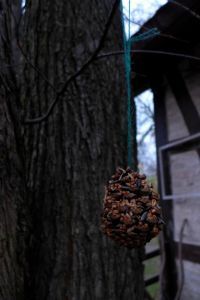
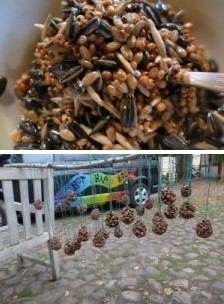
Text: Claudia Shulamit Frömmel Photos: Anna Adam
Translation: Etha Jimenez and Joseph Rebling
Schabbat Bejt HaChidusch zu Gast bei Ohel HaChidusch / 15.11.2014 / 22. Cheshwan 5775
For many years now it is a great pleasure for me to visit Bejt HaChidusch in Uilenburgshul in Amsterdam / Netherlands. A few steps away my mother was born more than a hundred years ago. Sometimes I lead services or workshops there; sometimes I just join for Shabbat services when I am in Amsterdam. Rabbi Hannah Nathans, whom I already knew from the Aleph seminar, had the idea to come to Berlin with one of her groups to visit Ohel HaChidusch. Many members of our small community participated in the organization: Sue reserved hotels, Channah took care of the booking of restaurants. Angela, Channah, Helen and Anna hosted those members of the group, who preferred private accommodation.
Rabbi Hannah Nathans and myself prepared an extensive program:
Kabbalat Shabbat in Fasanenstrasse; Shabbat at Ohel HaChidusch in Detmolder Strasse; Sunday at Centrum Judaicum and a guided tour through Berlin´s historical center and finally a visit to the Jewish Museum Berlin.
One highlight of the visit was the Shabbat at Ohel HaChidusch. Following a very moving Shakharit service, there was a lively exchange of experiences during kiddush. Later on, rabbi Hannah gave a shiur on the subject: " Is animal research allowed? What does our tradition say?" We studied rabbinical and scientific texts followed by an exciting discussion afterwards. After a coffee break, I gave a shiur on the subject: "Tora of the Imahot". In the context of parashah Chaje Sarah we had an intensive, sometimes quite controversial discussion.
After Havdalah all of us were grateful and glad about this meeting. We studied together and learned from each other, ate well and all of us expressed the desire to repeat such meetings, whether in Amsterdam or Berlin.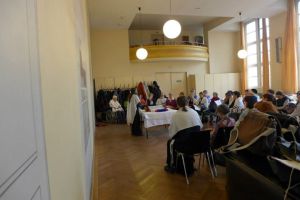
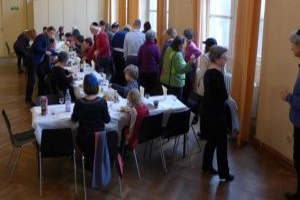
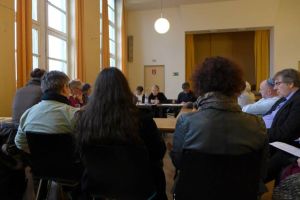
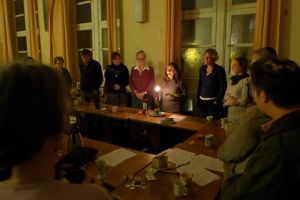
On Sunday I met the group in front of the Centrum Judaicum and gave a very personal tour of the center of Berlin with old and new stories from this area.
Thank you, Reb Hannah, for this beautiful idea. Come back soon to Berlin. You are always welcome to join us. The experience with you and Bejt HaChidusch means a lot to us.
Your very personal thank-you note to all of us has been particularly touching, which is why I include it here:
Shalom Jalda and Ohelista’s,
On behalf of our whole group I would like to thank you whith all my heart for your hospitality. It was a great experience for our participants. You made it possible that the whole group could come along by offering your beds. The food was excellent, and eco kosher. The restaurants you reserved for us were just right. The group was greatly impressed by your service, and does hope we can have more of this in BHC. The shiur by Jalda on the Torah of the imahot was found very interesting. The tour through Jewish Berlin, guided by Jalda, left an indelible impression. It was a most wonderful weekend.
I realise how much work this has been for you. Toda raba for everything!!!! And rav berachot on your kehilla. We hope to meet again soon!
Lehitraot, Rabbi Hannah
Text: Chasan Jalda Rebling Photos: Anna Adam
Translation: Etha Jimenez and Joseph Rebling
Sukkot / 8.10.2014 / 14. Tischri 5775
The afternoon before the 14th of Tischri 5775, Erev Sukkot, we met to build our Sukkah at Gutshof Gatow.
Like every year, parents and children built the sukkah, under expert guidance of Anna.
At the same time, a second group of us went on our field with a handcart to reap the fruits of last season.The children came back with abundant harvest, enough to decorate the sukkah and to prepare the Sukkot festival soup.
On the farm the sukkah was decorated and completed while the freshly harvested vegetables from many busy helpers were washed, cleaned and prepared for our soup.
Then Rita sparked the fire. Now the soup could cook.
Every year on Tu B'Shvat our children are planting pumpkin seeds from last year's harvest in a flower pot. Some months later at Sukkot the pumpkin is harvested in the Botanicum by our children.
After all extensive preparations it was time for Kiddush.
And every year exactly at this moment it starts raining. Our Sukkot-prayers for rain are fulfilled on the spot. So we are happy and grateful about it. But since we want to stay healthy, we moved to celebrate in the cozy carriage house. There we enjoyed the delicious, freshly cooked soup and all the culinary delights brought along.
It was, as always, the most beautiful sukkah we've ever had.
Thanks to the great hospitality of Rita and Uli we celebrated an unforgettable, turbulent and happy Sukkot with about 50 adults and children.
Later in the evening the sky ripped open and we admired the big full moon shining into our sukkah.
During the following days of Sukkot week, some of us went to Gatow with friends to sit in the sukkah and remember Am Israel wandering in the desert thousands of years ago and up to today.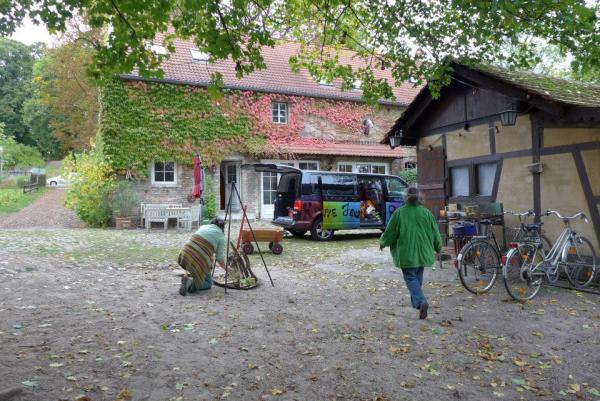
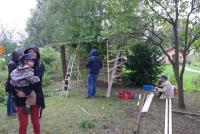
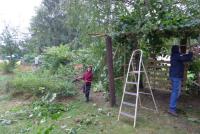
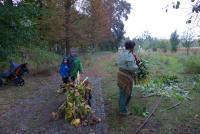
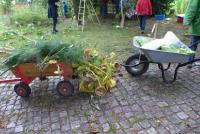
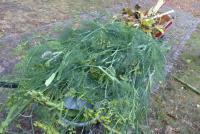
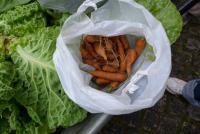
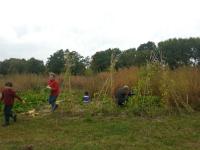
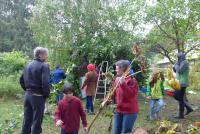
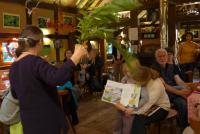
Text: Marlis Ventur Photos: Anna Adam
Translation: Etha Jimenez and Joseph Rebling
